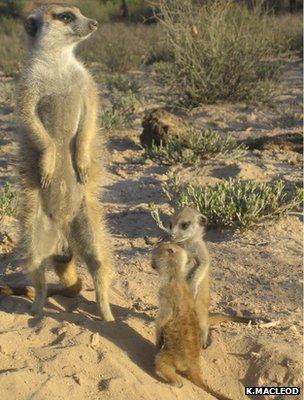Meerkats 'pay rent' to dominant female to stay in group
- Published

Some subordinate female meerkats wet-nurse a dominant female's offspring in exchange for not being evicted from the group, a study suggests.
Researchers found that females were more likely to do this if they had recently lost pups or had returned to the group following eviction.
A group's dominant female aggressively suppresses other females from breeding through infanticide or eviction.
The findings have been published in the Animal Behaviour journal.
"When dominant females are pregnant, in the last few weeks of the pregnancy they usually throw out the top level of subordinate females," explained co-author Kirsty Macleod, a zoologist at the University of Cambridge.
"That can be four or five subordinate females that are really strongly aggressed.
"This is because if a female is pregnant herself, she is more likely to kill the pups of another pregnant female in an attempt to try and secure care for her own pups.
"In the past, we thought that this behaviour was to try and stop the (dominant female's) pups being killed,"
Ms Macleod told BBC News that it was much more beneficial for females to belong to a group.
"If they are on their own then they have a much more higher likelihood of being predated," she said.
"In many cases, these females are evicted and we never see them again, so returning to the group is really crucial to their survival.
"What we do see in the wild when they do return to the group is this extreme grovelling behaviour, so we can see that they are quite obviously trying to appease the dominant female. When they start lactating, this seems to fit with that behaviour [pattern]."
Damp nipples
The idea of subordinate females "paying rent" was based on data gathered from research carried out between 1996 and 2011, during which time scientists observed the behaviour of 40 groups of meerkats.
Because most wet-nursing occurred underground in a group's burrows, females were identified as producing milk through the presence of suckle marks and sand being stuck to damp nipples.
"Just the sheer volume of data available to me meant that I could look at a lot of different things and fairly definitively make these assumptions, even if it is just short of saying that this is definitely what is happening," Ms Macleod explained.
The meerkats in the study are part of a long-term project headed by the University of Cambridge and Professor Tim Clutton-Brock, who is a co-author on the paper.
The project, carried out in the Kalahari region of South Africa, also featured in the TV natural history series, Meerkat Manor and a Natural World documentary, to be broadcast on BBC2 (except Scotland) at 2100 UK time.
"Wet-nursing by formerly evicted meerkats may be a way of 'paying rent' to be allowed back into the group without receiving further aggression," Ms Macleod observed.
She added that researchers had long known about this "allolactation" behaviour among meerkats, with it occurring in almost half of the litters.
But, she observed: "In a number of cases, it looks as if they are doing it when they are not pregnant themselves. Physiologically speaking, that is quite a big jump in terms of co-operative behaviour."
The University of Cambridge researcher explained that wet-nursing was just one of a suite of co-operative behaviours that subordinate meerkats do.
"More common behaviour includes feeding the pups when they are a little older, such as catching a scorpion or other invertebrates and passing it on.
"They also babysit as well, so when the pups are very small a subordinate female will stay at the burrow for the entire day, meaning that [the adult is] losing all the benefits of foraging for that day."
Ms Macleod said that she planned to carry out further research as part of her PhD research: "What I would like to look at in order to nail this (rent) idea down is whether the females that come back and start lactating are subject to less aggression.
"Basically, being a subordinate female meerkat is quite a rough deal because you are in a group and you are caring for another females' young.
"Then, if you try to have your own young, you are chased out of the group or your pups get eaten.
"So there is this constant and very complex trade-off between the costs of trying to leave the group and have your own offspring against the benefits are being in the group."
- Published22 July 2010
- Published7 July 2010